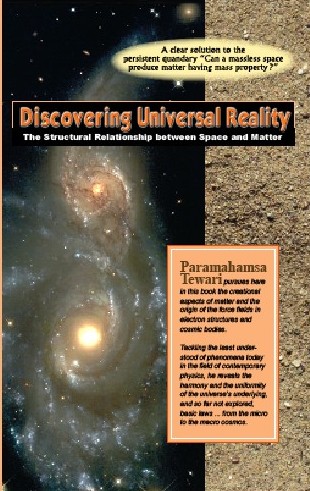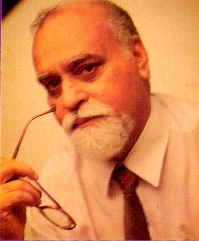What if space was filled with a non-material but very dense fluid and matter was composed of 'holes' in that fluid? Visualize water as the omnipresent medium and tiny bubbles swirling around to eventually give form to everything that can be seen. You'd have an analogy of the way Paramahamsa Tewari, a nuclear engineer with a passion for physics sees the universe.
Tewari's Space Vortex Theory (SVT) explains universal reality in a radically different way from that proposed by physicists today. A new book titled Discovering Universal Reality is available from his site (PDF download - 1.3MB) or in print from Stonehill Foundation in Kerala, India (stonehillfoundation@asianetindia.com). Tewari summarizes and explains the principles of SVT in a way that is understandable to everyone. You do not have to follow his equations to get the gist of what is said.
According to Tewari's theory, there is only one basic, stable particle - the electron - which in combination of great numbers builds atoms and thus makes up all the matter we perceive. The electron is seen as a bubble in the fluid of space, created by circulation of the space medium. When that circulation exceeds the space medium's limit of cohesion, it leaves a tiny spherical void. The existence of this tiny void stresses the incompressible space medium creating the electrical and gravitational properties we associate with matter.
Light and heat are oscillations of matter but they are transferred through space by a wave-like disturbance of the medium of which matter consists. There are no "photons" to visualize as separate particles, merely successive expanding "shells" of a disturbance propagating through space with the speed of light - c.
To vizualize this, let's look at the sea shore. The waves of water (the medium) transmit a force to the pebbles at the shore, they move them, roll them around, and in time grind them into fine sand. But there is no particle doing all this work - merely the waves of the medium. And the medium of space is much more dense than water...
But I better let Tewari speak, lest I get carried away and inject too much of my own - in this case necessarily secondary - understanding of things. Tewari's views have revolutionary implications for our understanding of the universe and they will - if proven correct - allow us to gain a conceptual understanding of physical reality. What a change that would be from today's physics which has become an esoteric labyrinth of mathemathical constructions that - it is said - only the brightest (but really perhaps only the most convoluted?) minds can grasp.



